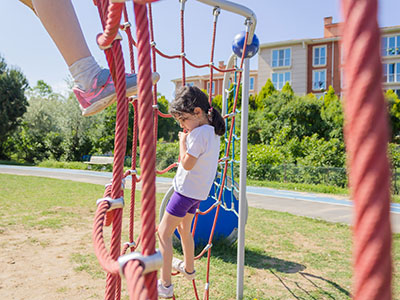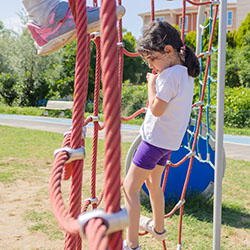Spring has barely started, but many parents are already thinking about summer activities for their kids. For those of us with neurodiverse children, figuring out what camps or classes they might like, and where they’ll be accepted so they can get the extra support they might need, gives us even more to consider. Here are some tips from our Family Resources team at Seattle Children’s Autism Center – and my own experience as the parent of a now-adult autistic daughter.
Where can I find summer camps?
For some kids on the autism spectrum, nearly any class or camp can be accessible with just a little extra preparation. Other children have higher support needs and will need more specialized opportunities.
Our Family Resources team at the Autism Center maintains a list of summer camps and year-round recreation options for children of all ages and levels of support need. You can find a link to this document at the bottom of this page.
We do our best to stay up to date, but it’s impossible for us to know about everything being offered across our state. When you’re looking for summer activities we recommend you also:
- Ask other parents! Parents are often the best source of information about local activities that have worked well for other neurodivergent kids.
- If there’s an Arc or a Parent-to-Parent group in your area, find them and see if they keep a list of local resources for summer recreation.
- Check your local parks and recreation departments to see what they offer. These can be in your city or county, but also in neighboring areas.
How do I know if a camp is a good fit for my child?
 You know your child best. Think about what they enjoy, and what they find challenging when you’re looking at different camp options. Our list of camps includes brief descriptions of the diagnoses they support, the developmental skills they focus on, and the funding sources they take.
You know your child best. Think about what they enjoy, and what they find challenging when you’re looking at different camp options. Our list of camps includes brief descriptions of the diagnoses they support, the developmental skills they focus on, and the funding sources they take.
Ask about the details that will matter to your child. When my daughter was school-age, I knew she needed to be in smaller groups of children, in environments that weren’t too crowded or overstimulating – outdoors was better than indoors for her, for example. She disliked messy craft activities, so I checked that there were alternatives to paint, glue, glitter and other glop when art projects were part of the camp day.
I also knew my daughter needed a 1:1 or 1:2 level of support to participate meaningfully. Some camps that serve autistic kids tell you up-front what level of support they can or cannot provide. You might be able to arrange to send someone with your child if they need extra help, such as for personal care assistance like toileting or for communication or behavior support. Some Applied Behavior Analysis (ABA) therapy providers will work in community settings such as a camp or class, for example. Sometimes it helps to think outside the box and talk to the camp about what might work for your child.
Camp is expensive! Can I get help paying for it?
Always ask about scholarships or sliding-fee options to pay for camp. Some places make this information easily available on their websites, while others only tell you about it if you ask. If they don’t have scholarships, you haven’t lost anything by asking.
If your child is a client of the Developmental Disabilities Administration (DDA), there are some camps and recreation options that take DDA funds. Ask the camp if they accept DDA funding, and what kind; and then ask your child’s DDA case manager if your child qualifies. If they don’t – tell them summer camp is important for your child and ask how they might qualify for it in the future.
Finally, a Ben’s Fund grant can be a great way to pay for some or all of the cost of a summer camp or class, up to $1,000 per year for a child or young adult with autism. We link to the Ben’s Fund webpage below for more information.
Check out these resources to help find and pay for summer camps and activities:
By Joy Gehner, Family Advocate, Seattle Children’s Autism Center
This article was originally published by a www.seattlechildrens.org . Read the Original article here. .



